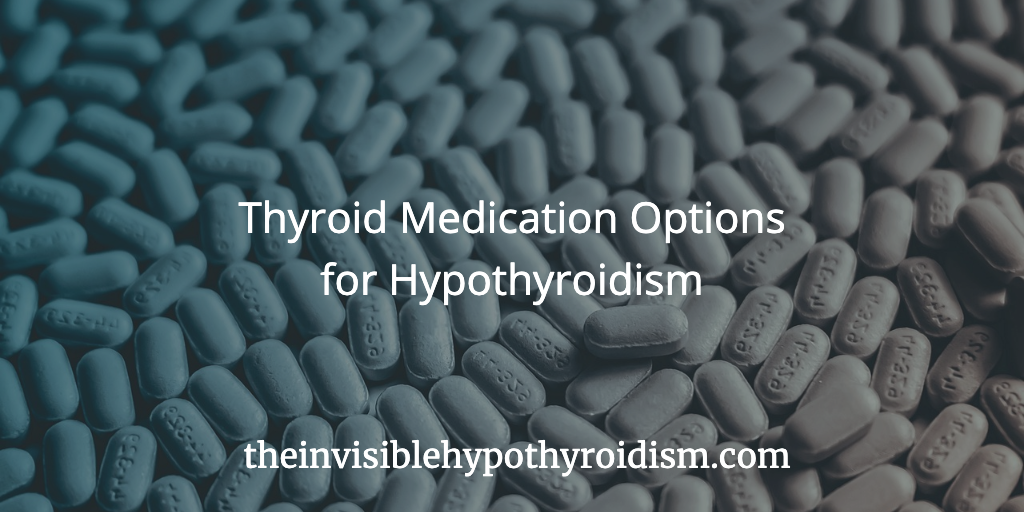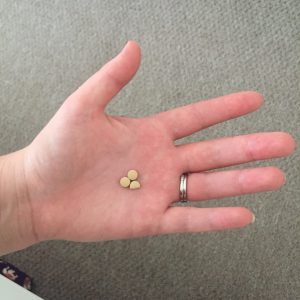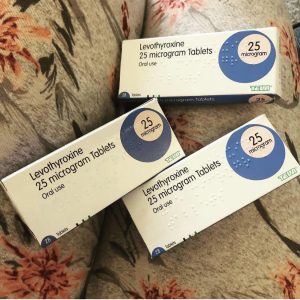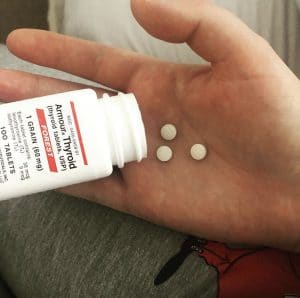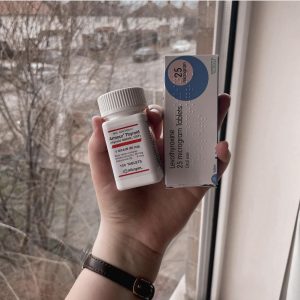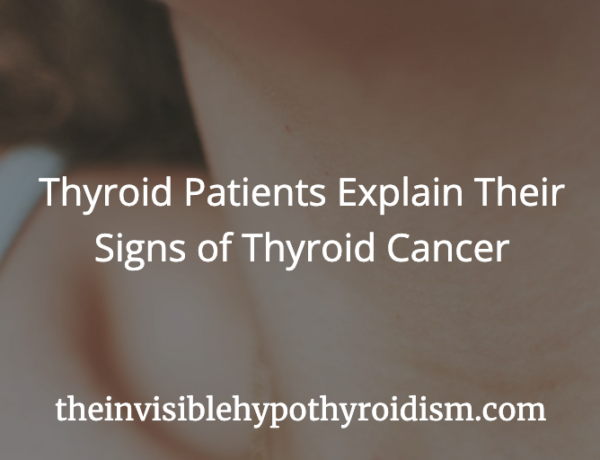Originally published on 24th March 2016 Last updated on 9th August 2024
Did you know that there are multiple medication options for hypothyroidism?
Are you on the right one for you?
Could a change in medication change your life?
What is The Difference in Options?
To understand the different options, let’s start by looking at the thyroid hormones you body produces (or at least, would do if it had a well-functioning thyroid!):
- T1 and T2: These are both hormone precursors and byproducts of thyroid hormone synthesis. They appear to be inert and do not act on thyroid hormone receptors.
- T3: Referred to as the ‘active hormone’, T3 has the greatest effect on the body’s energy levels and overall health and well-being.
- T4: This is a ‘pro-hormone’ (as a precursor of T3, having minimal hormonal effect itself). T4 is referred to as the ‘storage hormone’ and its main function is to convert to T3, both active T3 and Reverse T3.
- Calcitonin: This is secreted from the thyroid when blood levels are high in Calcium. It acts to lower levels of Calcium in the blood and stops the release of more Calcium from your bones into the blood. Because of this, it’s said to be effective in the prevention of osteoporosis.
Your body produces all of these hormones itself but some of the T4 produced by the thyroid is also converted into that very important T3 and T3 is the active thyroid hormone; the one that gives you energy and removes hypothyroid symptoms.
So, you can see why it may be beneficial to take a thyroid medication that replaces all or at least the two most important (T3 and T4) of these thyroid hormones in the case of hypothyroidism. However, there are many different options for thyroid medication, which are explained below.
Worth noting: calcitonin isn’t well absorbed orally, so may not have much benefit in NDT medications, and T1 and T2 may be made outside of the thyroid gland (debated), so are unlikely to be contained in NDT medications. [1]
An Instagram post I shared in 2021 about my medication experience:
T4-only Medication
Mainstream medicine feels that we only need to replace the thyroid hormone T4 in the case of hypothyroidism, since we only require small amounts of T1, T2 and Calcitonin anyway, and our body will convert some of the T4 to T3, to replace that thyroid hormone too. it seems simple enough, right?
Not always.
While some people do indeed do well on synthetic T4-only medications, such as Levothyroxine and Synthroid, many other thyroid patients fail to convert the T4 into enough T3, so when they take T4-only meds, they still feel unwell.
A conversion issue can be caused by an enzyme called iodothyronine deiodinase that is either deficient or not compatible for some people and is important in the activation and deactivation of thyroid hormones. T4 is converted into T3 by deiodinase activity. A problem with this can therefore cause conversion issues, where TSH can look ‘fine’, as well as Free T4, but with a low Free T3 and continued hypothyroid symptoms and development of other health conditions (such as mental health and heart/blood pressure problems).
Another cause could be “adrenal dysfunction“ (though it is more accurately referred to as hypothalamic-pituitary axis dysfunction), or vitamin deficiencies such as iron or selenium. By addressing these, you may address the conversion problem, but many other people simply have a problem converting and don’t know why. Therefore, they will likely benefit from taking a thyroid medication that gives them direct T3, instead of relying on their body to convert enough T4 into T3.
A study in 2018 showed that T4-only medication Levothyroxine was associated with a lower quality of life in those with Hypothyroidism.
However, many thyroid patients really do respond well to T4 medication such as Levothyroxine, and this is good. If you’re one of these people, then you may not feel the need to explore or trial other medication options. However, if you start to develop new symptoms and complaints or feel increasingly unwell, then keeping in mind that other options are out there can be really useful.
It is worth knowing that Levothyroxine is also available in a liquid form for those who find it difficult to swallow tablets.
Levothyroxine injections are also available, though typically reserved for those experiencing life threatening myxoedema coma. If you’re not absorbing oral Levothyroxine, it may be worth discussing injections with your doctor.
T3-only Medication
Instead of being on T4-only, you could also be prescribed a synthetic T3-only medication which skips the conversion stage. But as you have no T4 (the storage hormone) to convert to T3 for you, you may have to dose it more often, such as 3 or even 4 times a day.
Still, many thyroid patients do feel an improvement over being on T4-only medication alone, however, this medication doesn’t address low T4 levels and can be tricky to dose and keep on top of, requiring blood tests more often.
Related information: Updated RMOC Guidance – Prescribing of Liothyronine
T3 and T4 Combination
There is also the option of taking both synthetic T4 and T3 together, to try and mimic more closely what the thyroid gland would be putting out, if it was working properly.
Thyroid patients who have tried this do often report much better results than using T4 on its own, as it gives you that direct T3 and doesn’t rely on your body converting it.
This is often done by taking Liothyronine and Levothyroxine together, however is there also a medication named Adthyza, which is mentioned below.
NDT (Natural Desiccated Thyroid)
Natural Desiccated Thyroid medication is most often dried porcine (pig) thyroid gland (bovine over the counter NDT does exist) and gives you both T3 and T4. It is disputed whether brands such as Armour Thyroid and NP Thyroid also include small amounts of T1, T2 and Calcitonin. [1]
However, it is worth noting that these brands of NDT do not appear to state inclusion of these on their packaging, whereas amounts of T3 and T4 are stated.
Adthyza is a newer brand of NDT, which clearly states it only contains desiccated porcine T3 and T4.
Natural Desiccated Thyroid contains porcine thyroid gland (though limited bovine brands are found over the counter), available on prescription in the UK on a named-patient basis (though often isn’t easy to get), as well as meeting the guidelines of the US Pharmacopeia.
NDT medications are available in most countries through a doctor or medical professional. However, some thyroid patients take to self-sourcing over the counter brands (which can be very risky).
NDT is a medication and should ideally be prescribed and managed by a doctor wherever possible. Many thyroid patients mistake it for a ‘supplement’ but it needs to be dosed correctly, with full thyroid panel testing conducted regularly too.
Some people dose NDT twice a day, taking half their dose in the morning and the other half mid-afternoon. Others take it in one go in the morning. Different patients may experience different levels of benefits (if at all) from taking it either way.
NDT removes the need to rely on the body converting T4 to T3.
Study
A study published in the Journal of Clinical Endocrinology and Metabolism in 2013, titled Desiccated thyroid extract compared with levothyroxine in the treatment of hypothyroidism: a randomized, double-blind, crossover study, compared NDT medication to T4-only medication in the treatment of hypothyroidism. The results showed that almost half (48.6%) of patients preferred NDT, with 18.6% preferring T4-only, and 32.9% having no preference.
This study indicates that NDT can be superior to synthetic T4-only medication for many hypothyroid patients.
If you’re vegetarian, please see this article concerning options.
NDT has been used to treat hypothyroidism for over a hundred years. Interesting history about its use is mentioned in various books, and I’ve covered it all in great detail here.
NDT and T4 Combination
Seen less often is the prescribing of NDT and Levothyroxine together, however, this is the combination I am on at the time of updating this article.
My body (and thyroid levels Free T3 and Free T4) responded to NDT alone well, for several years, until the birth of my first child in 2020, after which it would optimise my Free T3 levels, but leave Free T4 at the bottom of the range. If I were to keep increasing my NDT in this situation, I would end up very overmedicated, so my doctor offered a small amount of Levothyroxine alongside the NDT (the brand I’m on is Armour Thyroid).
Although somewhat controversial, I have benefitted hugely from this combination as the Levothyroxine raised my Free T4 to optimal levels, alongside an optimal Free T3. It works in a similar way to the synthetic T3 + synthetic T4 combo.
Some online sources may claim that this combo drives up Reverse T3 levels or exacerbates adrenal dysfunction – I’ve experienced neither of these and have only felt well on this combination for the last two years. There is also a lack of hard evidence behind these claims, so do keep in mind that different people and different bodies can respond differently to different medication types. What is most important is that a responsible doctor is managing these medications and testing you often enough to keep the dosage correct for your needs.
Compounded Thyroid Medication
Compounded thyroid medication offers the advantage of being made without any fillers, which can be useful if you do not tolerate them well, such as gluten or lactose. The amounts of T3 and T4 are usually similar to NDT, but doctors can order for the amount of each to be adjusted to make the exact dosage your own body needs. It is essentially more personalised. This can be the answer for those who do not feel well on synthetic T3, T4 or NDT medications.
Most compounded thyroid medications are ‘immediate release’ versions, which means that they release the active medication immediately after taking, but compounding pharmacists are also able to make sustained release versions, where the medication is released more gradually; continuously throughout the day.
Related Article: I Don’t Want to Take Thyroid Medication. Can I Take Something ‘Natural’ Instead?
Update as of September 2022: Compounding of thyroid medication has been suspended or ‘banned’ by the FDA. Thyroid patients are trying to upturn this by emailing at [email protected]
So, Which Medication Should You Be On?
If you’re currently doing well on your thyroid medication, then you don’t need to do anything regarding your medication regimen.
But you may have read the above and thought “Brilliant. How do I change to T3-containing medication?”
Well, the hardest part can be trying to get your doctor to prescribe anything other than T4-only medicine.
The vast majority of mainstream doctors have been trained to stick to prescribing T4 synthetics, so many patients these days are unfortunately having to go private to see a doctor who will prescribe other medication options or even self-source it online, which carries many risks, just to get the medication they need to function like a normal human being.
What is the Best Thyroid Medication?
The best thyroid medicine is the one that works best for that particular person.
There is an excellent paper called Functional and Symptomatic Individuality in the Response to Levothyroxine Treatment which shows that everyone is individual and has different thyroid treatment needs. [2]
Another paper titled Time for a reassessment of the treatment of hypothyroidism concluded:
“It appears that we are witnessing a consequential historic shift in the treatment of thyroid disease, driven by over-reliance on a single laboratory parameter TSH. The focus on biochemistry rather than patient symptom relief should be re-assessed. A joint consideration together with a more personalized approach may be required to address the recent surge in patient complaint rates.” [3]
If you are not feeling well despite being on thyroid medication, it could be because your test results are in the “normal” range but not at the “optimal” level for you.
A note on brands and generics:
One brand of thyroid medication is not necessarily better than another – it depends on what works for you. Some people can be allergic or sensitive to binders or fillers in certain brands, or feel well on one and feel symptoms come back when given a generic substitute. If you feel well on a particular brand and type, make sure this is always stated on your prescription and that the pharmacy knows this too.
Related Articles:
Signs Your Thyroid Medication May Need Adjusting
What to Expect When You Change Thyroid Medication Dose
Please leave your experiences of different thyroid medication options in the comments below. To read about mine, please see here.
See also:
The book Be Your Own Thyroid Advocate: When You’re Sick and Tired of Being Sick and Tired, which helps you to advocate for your own thyroid health.
***
References:
[1] Tired Thyroid: From Hyper To Hypo To Healing – Breaking The TSH Rule by Barbara S. Lougheed
[2] https://www.frontiersin.org/articles/10.3389/fendo.2019.00664/full
[3] https://bmcendocrdisord.biomedcentral.com/articles/10.1186/s12902-019-0365-4

